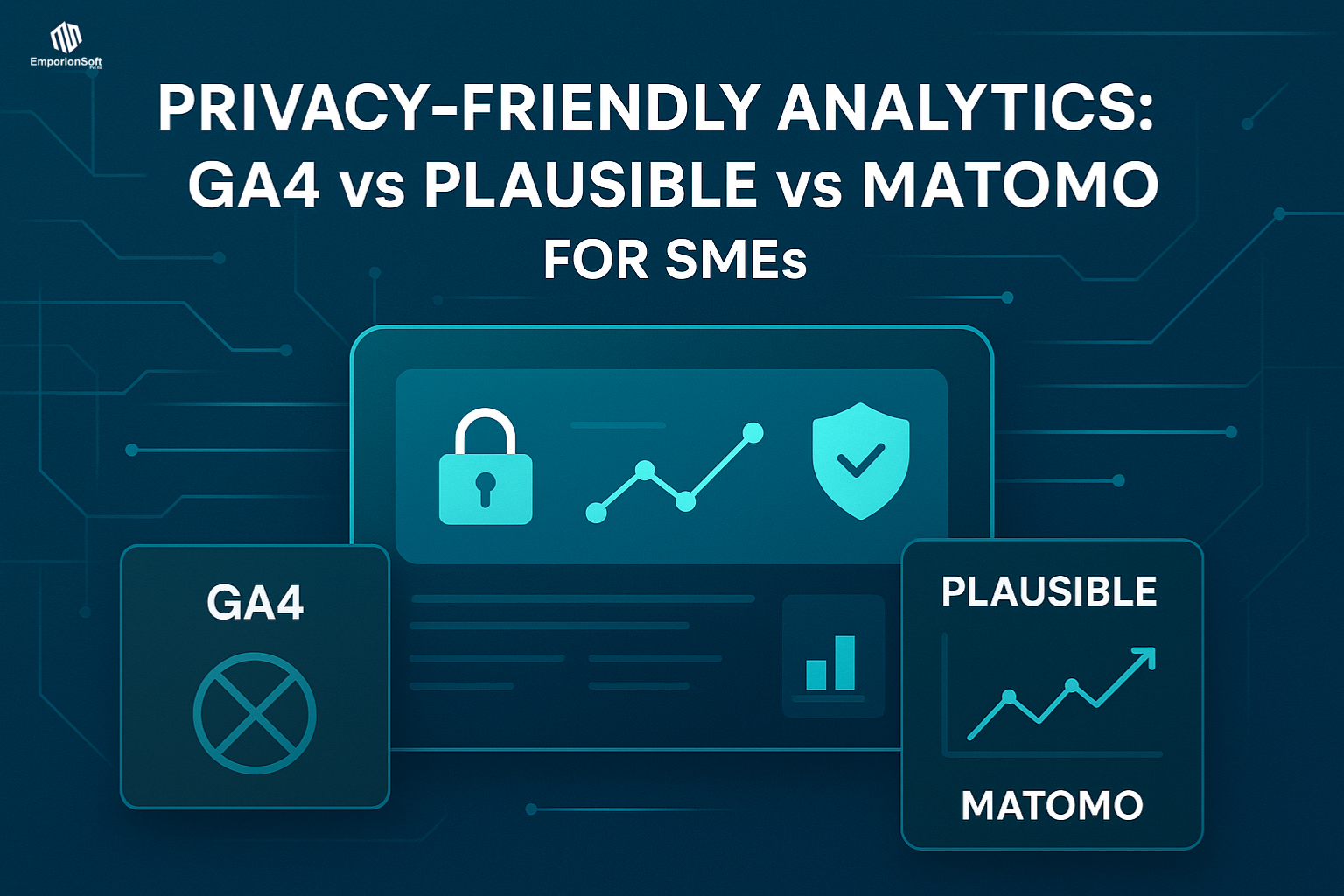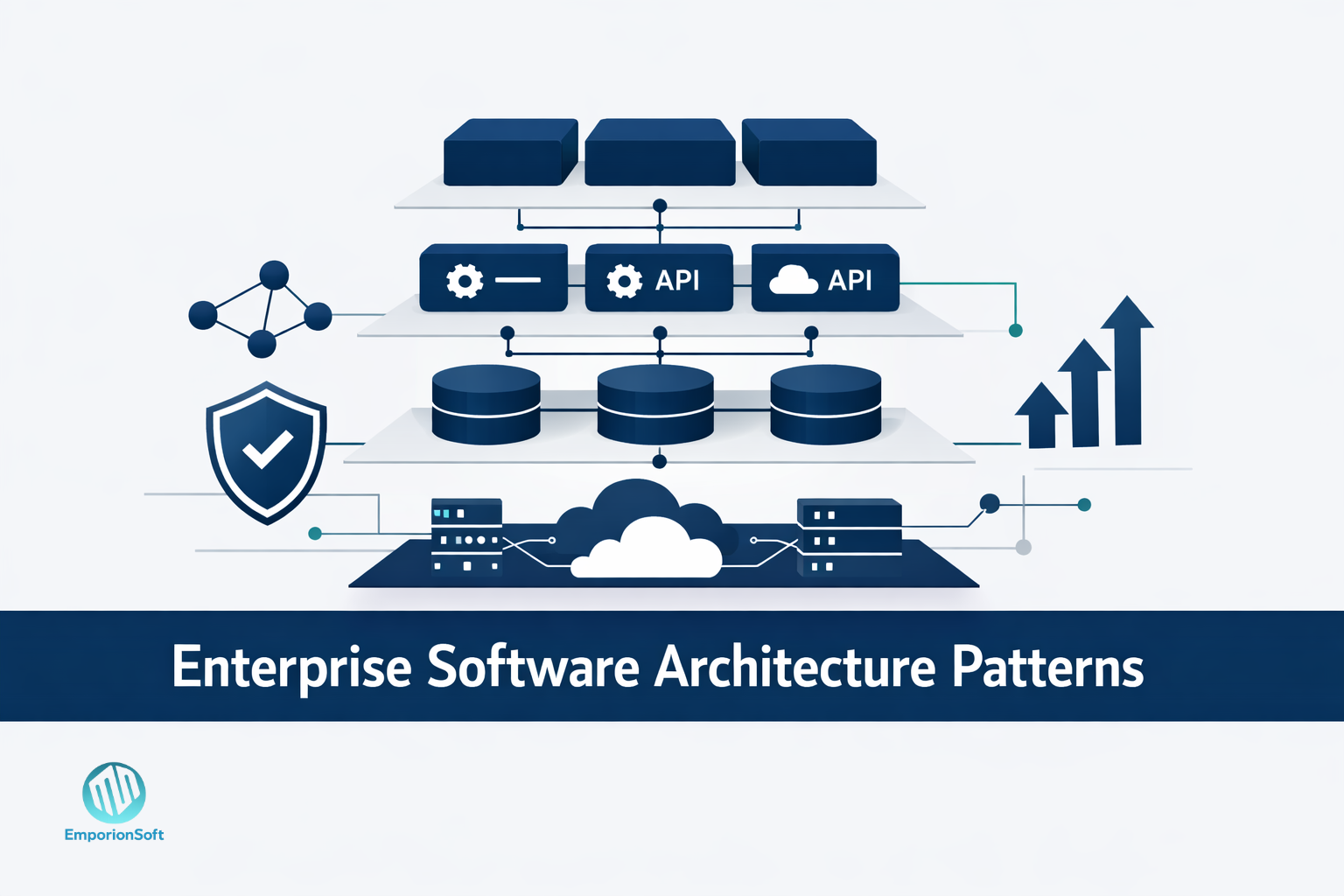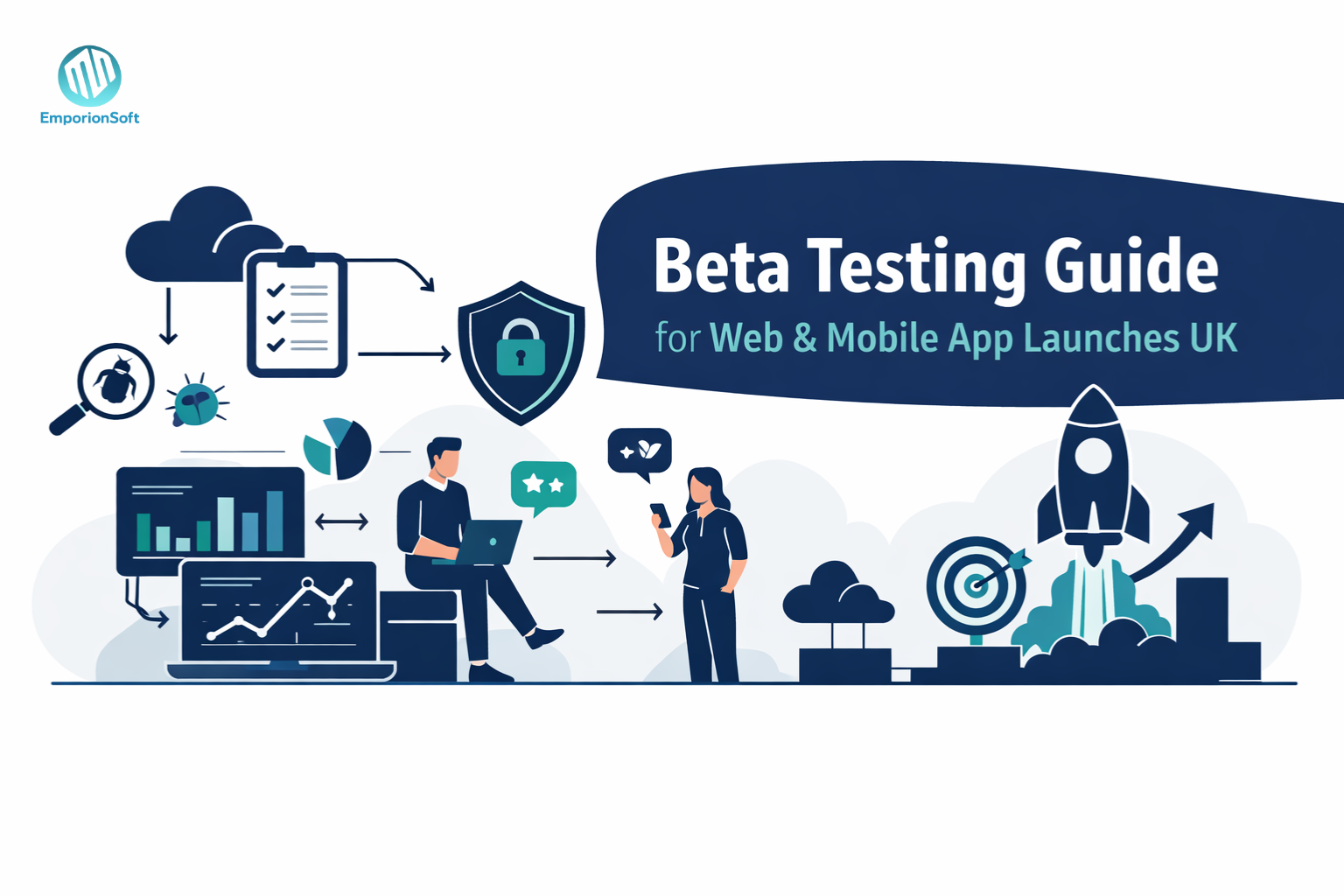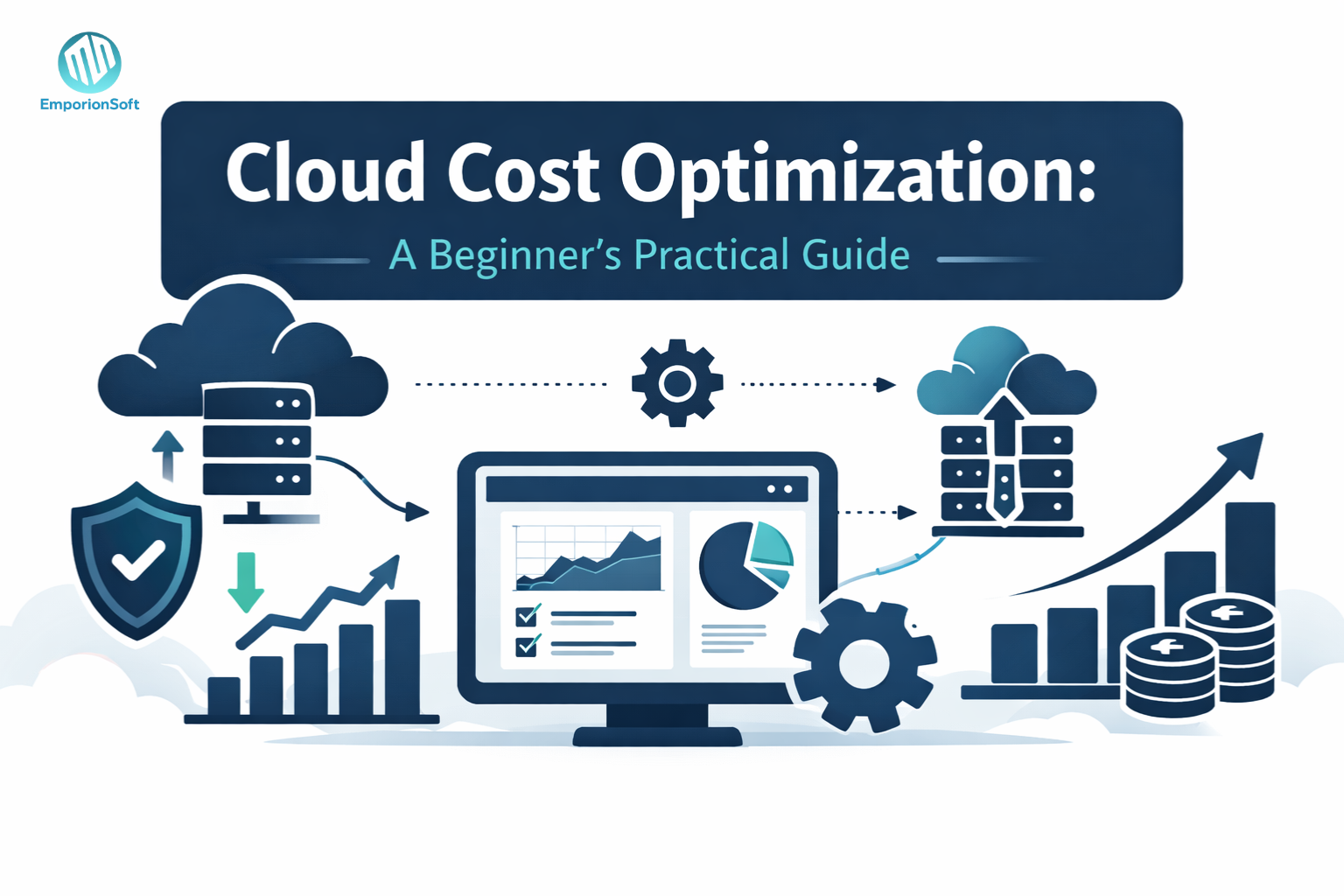The Rise of Privacy-Friendly Analytics: Why It Matters for SMEs
In the era of heightened data awareness and stricter compliance laws, small and medium-sized enterprises (SMEs) are re-evaluating how they collect, store, and interpret digital insights. With the growing emphasis on user privacy, the demand for a privacy friendly analytics comparison has never been greater. Businesses today no longer view analytics as just a performance tool but as a trust-building mechanism — one that reflects their commitment to ethical, transparent data practices.
According to Statista, over 70% of global internet users are concerned about how websites track their online behaviour, while Forbes reports that companies prioritising privacy experience 20% higher customer trust scores compared to their counterparts that rely heavily on third-party cookies. These figures reveal an undeniable shift: data analytics is moving from intrusive tracking to consentless, privacy-first monitoring.
Why Traditional Analytics Are Being Re-Evaluated
For decades, Google Analytics — now transformed into GA4 — has dominated the market as the default choice for website performance tracking. However, as governments worldwide tighten data protection regulations such as the General Data Protection Regulation (GDPR) and California Consumer Privacy Act (CCPA), GA4’s approach to data collection and consent is increasingly being scrutinised.
Many SMEs find themselves asking whether the convenience and free access offered by Google Analytics justify the potential trade-offs in data ownership and regulatory exposure.
GA4’s reliance on user identifiers, cross-device tracking, and Google’s cloud-based data processing means businesses often relinquish control over how and where their data is stored. This creates growing uncertainty about data sovereignty — especially for companies operating within the European Union or regions with strong privacy mandates.
As privacy awareness deepens, many businesses are seeking analytics alternatives to Google Analytics that provide transparency, control, and ethical data handling without compromising performance insights.
Emergence of Privacy-First Competitors: Plausible and Matomo
Enter Plausible and Matomo, two analytics platforms redefining how privacy and performance coexist.
-
Plausible is an ultra-lightweight, cookie-free analytics platform designed for transparency and simplicity. Its minimalist dashboard prioritises essential metrics without intrusive data collection, making it ideal for SMEs seeking lightweight privacy-focused web analytics.
-
Matomo, on the other hand, offers an open-source, self-hosted solution that grants full control over data. Known for its GDPR-compliant analytics comparison, Matomo allows organisations to host data on their own servers, ensuring 100% ownership and compliance assurance.
Together, these platforms embody a new generation of privacy-first analytics tools that align with the principles of privacy by design and data minimisation.
The Shift Toward Cookie-Free, Transparent Insights
The traditional web analytics model — built around cookies and behavioural tracking — is rapidly losing relevance. With Google phasing out third-party cookies and users increasingly rejecting cookie consent banners, businesses must now pivot towards cookie-free analytics frameworks.
Privacy-centric tools like Plausible and Matomo operate on aggregated, anonymised data, removing the need for user consent while still providing actionable business insights. This “no cookies, no consent” model enables SMEs to focus on growth while staying aligned with global privacy regulations.
This evolution isn’t merely a technical shift; it’s a strategic one. In a market where trust equals loyalty, transparency in data handling becomes a competitive advantage. Businesses that adopt privacy-focused analytics not only future-proof themselves against regulatory risks but also strengthen their brand integrity in the eyes of consumers.
As the debate over data ownership, consent, and compliance intensifies, SMEs must navigate an increasingly complex digital ecosystem. The upcoming privacy friendly analytics comparison between GA4, Plausible, and Matomo will shed light on how each platform addresses these challenges — and which solution best fits businesses striving for ethical, data-driven growth.
For organisations aiming to build compliant, cloud-ready solutions that prioritise both performance and privacy, EmporionSoft continues to deliver secure, data-conscious software architecture. Explore how privacy and innovation converge in our insights on The Future of Cloud Computing — a crucial foundation for tomorrow’s analytics landscape.
The Privacy Revolution: From Cookies to Consentless Tracking
In today’s digital landscape, data protection regulations have transformed how organisations collect and analyse user information online. The General Data Protection Regulation (GDPR), California Consumer Privacy Act (CCPA), and the upcoming ePrivacy Regulation have collectively redefined what constitutes ethical and compliant data processing. This shift has triggered a fundamental rethink of web analytics strategies for small and medium-sized enterprises (SMEs). Increasingly, companies are turning to privacy friendly analytics comparison frameworks to evaluate which tools align with evolving privacy expectations and legal obligations.
For years, businesses relied on cookie-based tracking systems — particularly Google Analytics — to gather user data for performance optimisation and marketing insights. However, as privacy laws advance and user consent becomes more complex, traditional analytics methods are being challenged. SMEs are now exploring cookie-free analytics platforms like Plausible and Matomo, which allow data insights without compromising user trust or compliance.
The End of Cookies: What It Means for Small Businesses
The digital economy once revolved around cookies — small text files that track user behaviour across websites. These cookies enabled highly targeted advertising and deep behavioural analytics. But they also blurred the boundaries of consent, leading to a surge in privacy concerns and regulatory scrutiny.
The GDPR mandates that any non-essential tracking requires explicit user consent, while the CCPA gives consumers the right to opt out of data collection altogether. As a result, businesses that depend heavily on third-party cookies now face operational and reputational risks. A study published by TechRadar found that nearly 60% of users decline cookie consent pop-ups, resulting in substantial data loss for analytics teams (TechRadar, 2024).
To mitigate these challenges, SMEs are seeking analytics platforms without cookies — solutions that respect user anonymity and reduce the friction caused by constant consent requests. Platforms like Plausible and Matomo are at the forefront of this movement, offering transparent, lightweight systems that do not rely on cookies to gather insights.
These cookie-free web analytics comparison models are designed around data minimisation — collecting only what is necessary — and anonymisation, ensuring no personally identifiable information (PII) is stored or shared. This not only keeps businesses compliant but also reassures users that their privacy is genuinely respected.
Consentless Analytics and GDPR Compliance
The term consentless analytics may sound contradictory, but in the privacy-first era, it represents the next stage of responsible data measurement. Unlike traditional tracking models, consentless analytics tools rely on aggregated and anonymised data that fall outside the scope of GDPR consent requirements.
For example:
-
Plausible Analytics operates with a 100% cookie-free approach, ensuring every page view is tracked anonymously without the need for personal identifiers or IP storage.
-
Matomo, particularly in its self-hosted version, offers complete data ownership and localised storage, enabling businesses to keep all analytics data within their jurisdiction.
By contrast, Google Analytics 4 (GA4) still depends on user-level identifiers and cloud-based storage, which complicates GDPR compliance. Although GA4 includes enhanced privacy settings, such as IP anonymisation and limited data retention, its processing through Google’s servers in the US raises ongoing data sovereignty concerns. In fact, the EU GDPR Portal reports that several European data protection authorities have deemed GA4 non-compliant due to cross-border data transfers (EU GDPR Portal, 2024).
SMEs adopting Plausible or Matomo benefit from simpler compliance pathways. These tools don’t require user consent banners because they do not collect personal data, meaning user experience improves while legal risk decreases. For growing businesses, this dual advantage — operational simplicity and compliance confidence — makes privacy-first analytics a compelling choice.
Building Compliant Digital Ecosystems with EmporionSoft
As privacy laws continue to evolve, so must the digital infrastructure supporting analytics and marketing. Implementing the right analytics tool isn’t just a compliance decision — it’s a strategic one. The future belongs to systems that combine transparency, speed, and respect for user data.
At EmporionSoft, we help businesses build compliant, privacy-conscious digital ecosystems tailored to their operational needs. From integrating GDPR-aligned analytics to developing privacy-by-design software solutions, our team ensures that technology enhances compliance rather than complicates it.
For SMEs aiming to stay competitive in an era defined by privacy-first data intelligence, understanding — and implementing — modern analytics tools like Plausible and Matomo is no longer optional. It’s a business imperative.
Privacy Friendly Analytics Comparison: GA4, Plausible, and Matomo Explained
As businesses continue shifting towards transparency and data protection, the demand for privacy friendly analytics comparison frameworks has surged. Small and medium enterprises (SMEs) now face an essential decision — how to measure performance while respecting user privacy and adhering to strict data protection laws. Among the many contenders, three platforms stand out: Google Analytics 4 (GA4), Plausible, and Matomo. Each offers unique approaches to tracking, storage, and privacy — from Google’s cloud-dependent model to Plausible’s cookie-free simplicity and Matomo’s robust self-hosted analytics solutions privacy options.
Below, we explore the origins, philosophies, and practical differences between these three leading analytics tools to help businesses make informed, compliant choices.
Google Analytics 4 (GA4): Evolving Under Privacy Pressure
Launched as a successor to Universal Analytics, Google Analytics 4 was designed to adapt to a post-cookie world. It uses event-based data models instead of traditional session tracking, offering a more holistic view of the customer journey across devices and platforms. However, while GA4 introduces advanced AI insights and predictive analytics, its privacy model remains dependent on Google’s cloud ecosystem.
GA4 continues to rely on pseudonymous identifiers and requires explicit user consent under regulations like GDPR and CCPA. Although Google has added features such as IP anonymisation, data retention limits, and regional data processing, the platform still processes vast amounts of information through its U.S.-based servers. This dependency raises concerns for businesses operating within the EU, where data transfer restrictions are becoming increasingly strict.
From a compliance perspective, GA4 represents a partial evolution — modernised in methodology but still rooted in a system that prioritises marketing optimisation over complete privacy autonomy. For SMEs that rely heavily on Google Ads or Search Console integrations, GA4 may remain useful, but it requires diligent configuration to avoid legal pitfalls.
In the context of Real-Time AI in Production, GA4’s machine-learning capabilities are noteworthy. Its predictive metrics (like churn probability) demonstrate how AI-driven analytics can fuel smarter marketing — but they also highlight the fine balance between innovation and privacy.
(Source: AnalyticsMania.com)
Plausible: Minimalist and Transparent by Design
If GA4 represents complexity and scale, Plausible is its ethical, lightweight counterpart. Founded in Estonia in 2019, Plausible was created as a simple, privacy-first analytics tool designed to replace intrusive tracking systems. Its core mission is to deliver meaningful website insights without cookies or personal data collection.
Plausible’s operation is refreshingly transparent — it tracks only aggregated, anonymous data such as page views, referrers, and device types. No IP addresses, fingerprints, or user identifiers are stored. This cookie-free approach ensures GDPR compliance by default, eliminating the need for intrusive consent banners.
Unlike GA4, Plausible is open-source, allowing developers to audit or self-host their instance for greater control. This aligns perfectly with the principles of self-hosted analytics solutions privacy, giving SMEs flexibility in managing where their data resides. Additionally, its compact 1KB script makes it one of the most lightweight privacy-friendly web analytics tools available, significantly improving page speed and SEO.
The platform’s simplicity doesn’t mean limitation. Plausible integrates seamlessly with modern frameworks, from Jamstack sites to cloud-native applications, empowering developers to maintain privacy without losing critical insights.
By adopting Plausible, organisations showcase their commitment to ethical technology — a value increasingly aligned with emerging trends in Decentralized Identity and Authentication, where user control and data sovereignty define the next phase of digital trust.
(Sources: Smashing Magazine, Mozilla Foundation)
Matomo: Open-Source and Self-Hosted for Data Control
Originally known as Piwik, Matomo has evolved into a fully featured, open-source privacy analytics platform that gives organisations complete control over their data. It’s particularly popular among privacy-conscious businesses, government agencies, and NGOs that prioritise full ownership and transparency in their analytics operations.
Matomo offers two deployment models — cloud-hosted and self-hosted. The self-hosted version is where it truly shines: all data remains on the organisation’s own servers, ensuring compliance with GDPR, CCPA, and local privacy laws. Unlike GA4, no third-party processors have access to your analytics data, eliminating concerns over cross-border data transfers.
From a feature perspective, Matomo mirrors the comprehensive nature of GA4 — supporting event tracking, heatmaps, session recordings, and goal conversion analytics — but it does so without the invasive tracking mechanisms that have plagued mainstream analytics platforms. It also includes a built-in consent manager, enabling businesses to customise their privacy controls.
Matomo’s strength lies in flexibility. While it may require more technical setup compared to Plausible, it provides unmatched data sovereignty and configurability — vital for enterprises managing sensitive information or operating under strict data governance frameworks.
For SMEs aiming to integrate advanced analytics while maintaining control, Matomo delivers the best of both worlds: rich insights and uncompromised compliance.
In summary, the privacy friendly analytics comparison between GA4, Plausible, and Matomo reveals a clear trend: data ownership and ethical analytics are no longer optional — they’re essential. Whether through GA4’s evolving compliance, Plausible’s minimalist transparency, or Matomo’s open-source autonomy, SMEs have more choices than ever to balance insight with integrity.
Privacy Friendly Analytics Comparison: GA4 vs Plausible vs Matomo
As digital privacy becomes a strategic priority, many SMEs are seeking tools that deliver reliable insights while respecting user rights and legal frameworks. The privacy friendly analytics comparison between Google Analytics 4 (GA4), Plausible, and Matomo reveals how each platform approaches data ownership, GDPR compliance, and scalability. Choosing the right analytics solution is not simply a technical decision—it’s a reflection of a company’s ethical standards, regulatory readiness, and long-term digital strategy.
1. Data Ownership and Control
Data ownership remains one of the most critical distinctions among these three analytics tools.
-
GA4: Data is processed and stored in Google’s cloud infrastructure, meaning businesses have limited control over storage location and retention. While Google provides access through dashboards, ultimate ownership lies with Google, creating uncertainty for organisations operating under strict data sovereignty laws.
-
Plausible: Offers full transparency. Businesses can self-host or use Plausible’s EU-based cloud. When self-hosted, companies retain 100% data ownership, ensuring no third-party access or commercial exploitation.
-
Matomo: Provides complete data autonomy, especially in its self-hosted version. All analytics data resides on the organisation’s own servers, making it one of the strongest options for data ownership and compliance control.
This makes Plausible and Matomo clear leaders for organisations prioritising independence and ethical data stewardship.
2. Hosting and Deployment Options
The hosting model directly impacts compliance and scalability.
-
GA4 operates exclusively in the Google Cloud ecosystem, offering ease of setup but limited flexibility for data storage.
-
Plausible supports both cloud and self-hosted environments, with its cloud servers hosted in the EU, making it appealing for businesses that prioritise European data protection standards.
-
Matomo is also hybrid, offering a managed cloud solution or a self-hosted version for total privacy control.
Self-hosted analytics platforms provide superior transparency and compliance but require some technical skill to maintain.
3. GDPR Compliance and Cookie Usage
The GDPR compliant analytics comparison reveals stark contrasts in how these tools handle consent and cookies:
-
GA4: Requires explicit consent under GDPR because it uses cookies and identifiers that can link to user sessions. The platform offers IP anonymisation, but regulators in several EU countries have ruled GA4’s data transfers to U.S. servers as non-compliant with GDPR.
-
Plausible: Fully cookie-free and processes no personal data, making it GDPR compliant by default. No consent banners are required, simplifying compliance and improving UX.
-
Matomo: Offers a flexible privacy model. In self-hosted setups, it can be configured as cookie-free, ensuring compliance without consent banners. When cookies are used (e.g., for advanced segmentation), explicit consent becomes necessary.
This demonstrates that Plausible and Matomo (self-hosted) provide a strong foundation for comparison of privacy centred analytics software, offering higher compliance out of the box.
4. Ease of Setup and User Interface
-
GA4: Easy to set up for users familiar with Google products but criticised for its complex interface and steep learning curve. The event-based model requires configuration knowledge.
-
Plausible: Extremely user-friendly, focusing on minimalism. Its clean dashboard prioritises actionable metrics, making it ideal for non-technical teams.
-
Matomo: More feature-rich, but its setup and interface are more data-heavy, appealing to technical users who want flexibility and in-depth reporting.
For SMEs with limited technical resources, Plausible offers the fastest onboarding and simplest insights experience.
5. Pricing and Scalability
Pricing can be a decisive factor, especially for small businesses.
-
GA4: Free to use but monetised indirectly through data integration with Google Ads. Scalability is nearly infinite, but privacy comes at the cost of user data sharing.
-
Plausible: Transparent pricing starting around $9/month, depending on traffic volume. The self-hosted version eliminates recurring costs but requires hosting infrastructure.
-
Matomo: Offers a free self-hosted version and paid cloud hosting starting at roughly $19/month. Its scalability depends on server capacity, but it remains one of the most cost-effective long-term solutions for privacy-conscious SMEs.
(Sources: Capterra, TechRepublic)
Mini Comparison Summary
| Feature | GA4 | Plausible | Matomo |
|---|---|---|---|
| Data Ownership | Google retains control | 100% business-owned | 100% business-owned |
| Hosting | Cloud (Google only) | EU Cloud / Self-hosted | Cloud / Self-hosted |
| GDPR Compliance | Partial (requires consent) | Full (no consent needed) | Full (if self-hosted, cookie-free) |
| Cookie Usage | Yes | No | Optional |
| Ease of Setup/UI | Moderate | Very easy | Moderate–advanced |
| Pricing (SMEs) | Free | From $9/month | Free self-hosted / $19+ cloud |
| Best For | Marketing-focused teams | Privacy-conscious SMEs | Technical users needing control |
6. Analytical Insight and Future-Readiness
When comparing scalability and integration potential, GA4 excels in AI-driven insights and predictive metrics, making it suitable for large-scale enterprises. However, Plausible and Matomo represent the future of ethical analytics — transparent, modular, and privacy-centric.
For organisations building modern, compliant infrastructures, exploring Harnessing the Power of Data Lakes offers further context on how structured data ownership supports analytics excellence. Similarly, The Software Developer’s Roadmap 2025 provides strategic guidance for SMEs aiming to integrate analytics responsibly within evolving tech ecosystems.
In conclusion, this privacy friendly analytics comparison demonstrates that while GA4 remains a dominant player, Plausible and Matomo lead the comparison of privacy centred analytics software — offering true data ownership, ethical compliance, and long-term sustainability for the modern digital era.
Lightweight Privacy Focused Web Analytics: The Performance Edge for Modern SMEs
Fast-loading websites convert better and rank higher. In an era where every second of page load time directly impacts conversion rates, search rankings, and user satisfaction, performance has become a business-critical metric. For small and medium enterprises (SMEs) that compete on agility and experience, adopting lightweight privacy focused web analytics tools is not just a compliance decision — it’s a strategic move toward faster, smarter, and more ethical digital performance.
Heavy, cookie-based analytics solutions such as Google Analytics 4 (GA4) can significantly slow websites down, introducing unnecessary scripts and tracking overhead. In contrast, privacy-first tools like Plausible and Matomo are engineered to be efficient, transparent, and scalable — ideal for performance-conscious businesses aiming to optimise user experience while respecting privacy laws.
Why Lightweight Analytics Tools Improve UX and SEO
Performance and privacy are now intrinsically linked. The Google Developers Blog consistently highlights that reducing JavaScript payloads and third-party dependencies enhances Core Web Vitals, a key factor in SEO ranking and conversion optimisation (Google Developers Blog, 2024). Traditional analytics tools, particularly GA4, rely on extensive JavaScript libraries, cookie storage, and real-time tracking mechanisms that consume bandwidth and increase latency.
-
GA4: The standard analytics tag (
gtag.js) and its associated scripts can exceed 45–60KB in total payload, including dependencies. This load can impact Time to Interactive (TTI) and Largest Contentful Paint (LCP), metrics crucial for SEO and UX performance. -
Plausible: By comparison, Plausible’s tracking script is just 1KB — roughly 50 times smaller than GA4. It loads asynchronously, with no cookies, no third-party calls, and no personal data tracking. The result is a negligible performance footprint, making it one of the best privacy friendly web analytics tools available for modern websites.
-
Matomo: While larger than Plausible, Matomo offers a modular architecture where unnecessary features can be disabled, allowing developers to tailor analytics to their infrastructure. When self-hosted, Matomo’s scripts can be cached and served locally, reducing latency and external dependencies.
From a business perspective, these architectural differences translate into measurable performance advantages. Faster load times mean reduced bounce rates, better engagement, and improved conversion efficiency — particularly for mobile-first audiences.
Measuring Performance Gains in Real-World Deployments
Real-world studies consistently demonstrate that lean analytics implementations yield substantial performance improvements. According to GTmetrix, websites can improve load times by up to 30% simply by removing heavy tracking scripts and third-party tags (GTmetrix, 2024).
Let’s break this down through practical examples:
-
A typical SME website using GA4 might experience an additional 200–400ms of render-blocking delay due to multiple script calls to Google’s servers.
-
Migrating to Plausible reduces this to less than 10ms, as the tracking script executes asynchronously and does not require cookie consent pop-ups or secondary network requests.
-
Matomo, when optimised with self-hosting, eliminates third-party calls entirely — ensuring data collection without reliance on external domains.
These optimisations don’t just boost speed; they also improve SEO visibility. Google’s algorithm directly rewards faster pages, with research showing that a 1-second delay can reduce conversions by 7%. For SMEs relying on organic traffic, the cumulative effect of lighter scripts can mean tangible business growth.
Furthermore, privacy-first analytics tools simplify compliance and remove the need for intrusive cookie consent banners. This leads to a cleaner user interface, smoother navigation, and higher visitor trust — essential factors for building credibility in competitive industries.
Balancing Simplicity, Privacy, and Performance
The simplicity of lightweight privacy focused web analytics extends beyond technical benefits. Tools like Plausible and Matomo streamline reporting interfaces, focusing on actionable metrics — visitors, bounce rate, and conversion flow — without overwhelming teams with redundant data layers.
In contrast, GA4’s complex event-driven model, while powerful, often demands specialised expertise, making it inefficient for smaller teams seeking quick insights. With privacy-first solutions, SMEs can maintain full transparency over how data is collected and used, aligning with evolving user expectations and global compliance standards.
Modern businesses that prioritise both speed and ethics can benefit greatly from EmporionSoft’s commitment to privacy-conscious and performance-optimised development. Our expertise in designing adaptive systems, as discussed in Adaptive Software Development, and our dedication to automation tools like Boost Developer Productivity with Cursor AI, demonstrate how technology choices directly enhance business agility.
Ultimately, adopting the best privacy friendly web analytics tools like Plausible and Matomo isn’t just about meeting compliance—it’s about setting a standard. When SMEs combine lightweight analytics with ethical data practices, they achieve faster websites, happier users, and stronger search performance — all without sacrificing privacy.
Data Control and Self-Hosted Analytics: The Next Step in Digital Sovereignty (2025)
In 2025, control over data has evolved from a technical preference to a strategic imperative. As regulations tighten and consumers demand transparency, data control and self-hosted analytics solutions have become vital for businesses seeking independence and long-term compliance. For small and medium enterprises (SMEs) in particular, choosing where and how analytics data is stored can directly impact trust, performance, and regulatory alignment.
The emergence of self-hosted analytics solutions privacy options such as Matomo and Plausible marks a turning point — enabling businesses to retain full control of analytics data within their infrastructure. This shift towards open-source privacy-friendly analytics represents not just a reaction to laws like GDPR, but a proactive embrace of ethical technology and sustainable digital governance.
Why Data Control Defines Business Resilience
Data has become one of the most valuable assets a business owns. However, when analytics platforms like Google Analytics 4 (GA4) store information on external cloud servers — often located outside the business’s legal jurisdiction — it raises critical data sovereignty concerns.
The Data Protection Commission (Ireland) and CNIL France have repeatedly warned organisations about cross-border data transfers that fail to meet the standards of the EU’s General Data Protection Regulation (GDPR) (CNIL France, 2024). These regulators have even deemed certain uses of Google Analytics as non-compliant, primarily because data flows through U.S. servers where privacy protections are weaker than in the EU.
By contrast, self-hosted solutions like Matomo and Plausible ensure that analytics data remains entirely under the business’s control. For SMEs operating in Europe or handling sensitive customer information, this architecture provides the transparency and localisation needed to comply with data residency laws — ensuring analytics insights never leave the company’s jurisdiction.
How SMEs Use Self-Hosting to Stay Compliant
Both Matomo and Plausible offer flexible deployment models that allow businesses to self-host analytics data on their own servers or private clouds:
-
Matomo Self-Hosted: Businesses can install Matomo on their internal infrastructure, meaning all visitor data — from page views to conversion events — stays within their local environment. This configuration eliminates the risks associated with third-party data processors and allows direct alignment with GDPR’s privacy-by-design principles. SMEs in industries such as healthcare or finance particularly benefit, as they often face stricter regulatory requirements.
-
Plausible Self-Hosted: Known for its simplicity, Plausible’s open-source edition allows lightweight installation on EU-based or in-house servers. The tool collects only aggregated, anonymous metrics, meaning it operates without cookies or identifiable information. This cookie-free architecture not only ensures compliance but also reduces legal overhead — no consent pop-ups, no complex tracking disclosures.
Such configurations grant businesses full visibility over what is being tracked and stored, empowering them to build analytics systems that are transparent, ethical, and legally defensible.
The Open-Source Advantage: Privacy by Design
The adoption of open-source privacy-friendly analytics solutions represents a fundamental shift in the digital landscape. Unlike proprietary tools such as GA4, open-source software promotes privacy-by-design — a framework that embeds privacy protection into every aspect of system architecture rather than adding it as an afterthought.
Open-source platforms like Matomo and Plausible are publicly auditable, allowing developers and privacy experts to verify that no hidden tracking or third-party integrations compromise data security. This transparency fosters trust and innovation, as global communities continuously review, improve, and enhance these systems.
Furthermore, open-source ecosystems promote interoperability — enabling integration with existing systems like CRM, ERP, or data visualisation tools without forcing businesses into restrictive contracts or infrastructure dependencies. This flexibility contrasts sharply with GA4’s vendor lock-in, where businesses must adapt to Google’s data models, updates, and policy changes with limited autonomy.
When organisations depend heavily on a single vendor’s ecosystem, they risk losing control over pricing, data accessibility, and even regulatory compliance. Open-source, self-hosted analytics guard against this by ensuring that data — the lifeblood of modern decision-making — remains firmly in the business’s hands.
Ethical Implications and the Future of Data Autonomy
Beyond compliance, self-hosted analytics solutions privacy models represent a deeper philosophical alignment with the principles of digital ethics and technological self-determination. Businesses are beginning to recognise that privacy is not a barrier to innovation — it’s a foundation for trust.
At EmporionSoft, this ethos is reflected in our broader commitment to building ethical, decentralised, and privacy-conscious software ecosystems, as explored in our article on Blockchain Beyond Crypto. Similarly, our insights on Ethics in AI emphasise how transparency and accountability in data handling shape the future of responsible technology.
As privacy regulations evolve and user expectations rise, SMEs that adopt open-source, self-hosted analytics solutions will not only ensure compliance but also position themselves as champions of digital integrity. In a world increasingly defined by data control, the organisations that own their analytics infrastructure will own their future.
Migration in Action: How SMEs Are Adopting Privacy-First Analytics
Across the digital landscape, small and medium-sized enterprises (SMEs) are increasingly replacing Google Analytics 4 (GA4) with privacy-first analytics tools such as Plausible and Matomo. This shift is not driven merely by compliance concerns, but by a broader recognition of the operational, ethical, and performance benefits that come from controlling one’s data. The growing momentum behind this trend underscores the need for a clear privacy-first analytics tools comparison — one that reflects real-world use cases and measurable results.
According to Statista (2024), over 35% of European SMEs have already begun exploring or deploying analytics alternatives to Google Analytics to ensure GDPR compliance and improve site performance. Case studies from platforms like G2 and independent Medium publications reveal that businesses making the switch to Plausible or Matomo experience not only smoother analytics operations but also tangible gains in user trust and conversion rates.
Case Example 1: A Digital Marketing Agency’s Switch from GA4 to Plausible
A mid-sized UK-based marketing agency, anonymised as “BrightWave Digital,” faced recurring challenges with GA4’s complex dashboards and cookie consent overhead. The agency noticed increasing friction among clients due to data collection disclaimers and slower site loading speeds caused by Google’s script-heavy tracking tags.
After migrating to Plausible Analytics, which operates with a 1KB lightweight script and no cookies, the agency reported:
-
A 22% improvement in average page load time, verified through GTmetrix performance audits.
-
Elimination of GDPR compliance concerns — no more cookie banners or consent delays.
-
Simplified client reporting, with dashboards showing only essential KPIs such as visitors, bounce rate, and referrers.
Before vs After (BrightWave Digital)
-
Before: GA4 causing 45–60KB load overhead, requiring legal disclaimers for cookie consent.
-
After: Plausible’s 1KB script, no cookies, fully GDPR-compliant, and faster reporting turnaround.
This transformation not only improved efficiency but also boosted client satisfaction and trust. Clients appreciated that the agency prioritised privacy-first analytics tools that didn’t compromise UX for data collection.
(Source: G2 Reports)
Case Example 2: An E-Commerce Startup’s Journey to Matomo
An emerging e-commerce retailer in Germany, referred to here as “EcoHaus Living,” was struggling with data localisation issues due to GA4’s reliance on U.S.-based servers. After receiving legal warnings from privacy auditors, the startup evaluated analytics alternatives to Google Analytics and migrated to Matomo’s self-hosted solution.
By hosting Matomo on their EU-based server, EcoHaus achieved:
-
100% data ownership — no third-party data transfers.
-
Full compliance with GDPR and Germany’s BDSG (Federal Data Protection Act).
-
Improved conversion tracking accuracy due to reduced cookie consent drop-offs.
Before vs After (EcoHaus Living)
-
Before: GA4 violating EU data residency rules, inconsistent tracking from rejected cookie banners.
-
After: Matomo self-hosted on EU servers, 100% compliant, and a 15% improvement in analytics accuracy.
The team noted that Matomo’s open-source flexibility allowed them to customise reporting dashboards and integrate data into their in-house BI tools — aligning perfectly with their privacy and scalability goals.
(Source: Statista, Medium Analytics Migration Case Studies)
Case Example 3: A SaaS Firm Seeking Simplicity and Trust
A SaaS-based SME offering project management software, anonymised as “FlowSync Systems,” found GA4’s complex interface and delayed reporting unsuitable for agile decision-making. Their leadership team decided to trial Plausible alongside Matomo to determine which system best suited their workflow.
Within two months, Plausible emerged as the preferred tool due to:
-
Real-time data accuracy without personal identifiers.
-
Minimal maintenance overhead, ideal for small technical teams.
-
Enhanced transparency in how user interactions were measured.
Clients responded positively to FlowSync’s updated privacy policy, which explicitly highlighted their shift to a cookie-free analytics system. The company reported a 12% rise in demo conversions, attributing it partly to higher user trust and improved website responsiveness.
Before vs After (FlowSync Systems)
-
Before: GA4 with consent banners, delayed insights, and technical complexity.
-
After: Plausible with instant reporting, cleaner UX, and privacy reassurance for users.
(Source: Medium)
Privacy-First Migration: A Business and Ethical Win
These real-world transitions reveal a clear pattern — SMEs are moving from complex, compliance-heavy tracking systems to leaner, transparent analytics that empower both users and business teams.
By adopting tools like Plausible and Matomo, SMEs achieve:
-
Faster site performance and better SEO.
-
Regulatory confidence through self-hosting and GDPR alignment.
-
Increased transparency that enhances brand reputation.
At EmporionSoft, we have witnessed similar success stories in our Case Studies section, where businesses leverage privacy-first technology to streamline operations and earn customer trust. We also discuss how analytics transformation complements agile workflows in Project Management Tools for Tech Companies — showcasing how smart data strategies drive digital maturity.
Building a Privacy-First Future with the Right Analytics Partner
As we conclude this in-depth privacy friendly analytics comparison of Google Analytics 4 (GA4), Plausible, and Matomo, one truth stands out — data privacy and ethical analytics are no longer optional; they’re foundational to modern digital success. The shift from cookie-based tracking to cookie-free, privacy-first web analytics reflects a broader transformation in how businesses interact with data, compliance, and trust.
In 2025, SMEs must not only measure their growth but also demonstrate accountability in how they handle user information. This balance between insight and integrity defines the new era of digital intelligence — one where transparency drives performance.
Key Findings: What the Comparison Reveals
Our exploration has shown that each analytics platform offers distinct strengths and trade-offs depending on the organisation’s goals, resources, and compliance obligations.
-
Google Analytics 4 (GA4) remains a powerful tool for data-driven marketing and predictive insights, especially for teams deeply embedded in Google’s advertising ecosystem. However, its reliance on third-party cloud infrastructure and user identifiers raises ongoing GDPR compliance and data sovereignty challenges. SMEs relying on GA4 must invest in careful configuration, consent management, and legal oversight to stay compliant.
-
Plausible, by contrast, stands out as the most lightweight and transparent option — a genuinely cookie-free, privacy-focused analytics platform. Its simplicity, speed, and default compliance make it ideal for small and medium-sized businesses seeking actionable insights without complex technical setups. With a 1KB tracking script, Plausible delivers minimal performance impact while ensuring ethical data collection and full GDPR alignment.
-
Matomo provides the best self-hosted analytics solutions privacy model. It’s the tool of choice for businesses that demand total control over their data and compliance posture. As an open-source privacy-friendly analytics system, it allows companies to store, process, and visualise all analytics information on their own servers — ensuring no third-party data access or cross-border transfer risks.
Together, these comparisons affirm that the future of web analytics lies in ownership, transparency, and performance efficiency, not invasive tracking or third-party dependence.
Recommendations for SMEs
When choosing an analytics platform in 2025, SMEs should evaluate three key factors:
-
Budget and Resources:
-
Startups and smaller firms may benefit most from Plausible, thanks to its affordable pricing and easy setup.
-
Larger organisations or those with in-house technical capacity may prefer Matomo’s self-hosted version, which offers long-term cost savings and data autonomy.
-
-
Compliance and Data Residency:
-
If your operations span across the EU or regions with strict privacy mandates, self-hosted Matomo ensures that analytics data remains within your jurisdiction — a vital safeguard for regulatory adherence.
-
For simpler compliance and global reach, Plausible’s EU-based cloud hosting remains a safe, transparent solution.
-
-
Control and Flexibility:
-
SMEs seeking integration with broader AI or business intelligence frameworks might still consider GA4 but must recognise its dependency on Google’s ecosystem.
-
For those prioritising ethical technology and independence, open-source analytics tools offer unmatched transparency and configurability.
-
The decision ultimately hinges on a company’s values and vision — whether to optimise around convenience or take the lead in shaping a privacy-respecting digital ecosystem.
The Case for Privacy-First Analytics in 2025 and Beyond
The growing global focus on digital rights and data protection signals that privacy-first solutions will soon become the default, not the exception. Cookie-free analytics not only simplify compliance but also strengthen brand credibility — showing customers that their trust is valued.
In an increasingly competitive online world, fast, compliant, and transparent analytics will define the brands that thrive. By aligning with privacy-by-design principles, SMEs can turn regulatory obligations into strategic advantages — improving UX, SEO, and conversion while ensuring ethical data practices.
(External Reference: European Data Protection Board)
Partnering with EmporionSoft: Your Path to Privacy-Driven Innovation
At EmporionSoft Pvt Ltd, we believe technology should empower businesses without compromising ethics. Our expert teams design and implement privacy-compliant analytics architectures, helping SMEs integrate tools like Plausible and Matomo into their digital ecosystems with confidence.
Whether you’re upgrading from GA4 or starting your analytics journey from scratch, we guide you through every step — from compliance assessment to full-scale integration and performance optimisation.
👉 Ready to embrace privacy-first analytics?
-
Learn more About EmporionSoft and our mission to build ethical digital solutions.
-
Book a personalised Consultation to discuss your analytics and compliance goals.
-
Or reach out directly via our Contact Us page to start your transformation today.
With EmporionSoft as your trusted partner, you’re not just choosing an analytics solution — you’re investing in a privacy-first, future-ready digital ecosystem built for performance, compliance, and enduring trust.











Why viewers still use to read news papers when in this technological world
everything is presented on web?